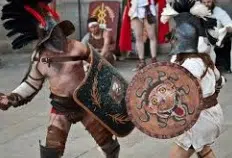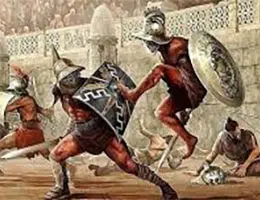 The notion of gladiator comes from the word gladiātor , a Latin term that in turn has its etymological origin in the Celtic language. The individual who, within the framework of a Roman circus , faced other fighters or even ferocious animals was called a gladiator.
The notion of gladiator comes from the word gladiātor , a Latin term that in turn has its etymological origin in the Celtic language. The individual who, within the framework of a Roman circus , faced other fighters or even ferocious animals was called a gladiator.
At the time of the Roman Empire , the circus was a place for the entertainment of the people . Theatrical performances were held there, races were held and different kinds of shows were put on.
In this context, gladiators were combatants who fought violently to entertain the public. These were usually prisoners of war , slaves or convicted criminals , although there were also some free men among them.
Gladiators could fight among themselves or against wild animals . They were trained in special schools and wore a helmet, shield and sword. At first, gladiators carried out their action for ritual purposes, although later they became individuals dedicated to entertaining people, even at the cost of their lives.
According to historians, it was not common for a gladiator to die in these combats. In any case, in some historical periods the public or the emperor decided on the fate of the loser, and could decree that he be killed in the middle of the Roman circus.
In 2014, a scientific study revealed that Roman gladiators ate mainly vegetables, among which grains, barley and wheat stood out. In other words, to stay in shape and achieve that spectacular performance that made them the protagonists of countless fictional stories, the gladiators ate a practically vegetarian diet .
This revealing data was obtained by a group of scientists made up of academics from the University of Bern , in Switzerland, and the Medical University of Vienna , in Austria. To do this, they took advantage of the remains of twenty-two gladiators that they had found in a Turkish cemetery. The amount of meat that, according to these specialists, the ancient Roman fighters ate was tiny compared to that of plant products.
 As if this data were not revealing enough for our current societies, which celebrate the consumption of meat and other products of animal origin as the basis of well-being and muscle development , the researchers also discovered that gladiators supplemented their diet with a drink based of vegetable ashes. It was a kind of tonic that helped them recover after a fierce confrontation or prepare for training.
As if this data were not revealing enough for our current societies, which celebrate the consumption of meat and other products of animal origin as the basis of well-being and muscle development , the researchers also discovered that gladiators supplemented their diet with a drink based of vegetable ashes. It was a kind of tonic that helped them recover after a fierce confrontation or prepare for training.
Apparently, the plant ashes that gladiators consumed helped them strengthen their bodies after hard exercise routines and also helped repair bones that had been damaged. According to the statements of Fabian Kanz , a forensic doctor at the University of Vienna, these effects can be compared with those provided by current magnesium and calcium tablets.
In short, gladiators are among the characters of the past that we associate with virility, extreme physical resistance and bravery, but a scientific study revealed that their diet is not related to what we would attribute to a hero today: Where is the chicken, where is the hard-boiled egg or cow's milk? Instead, legumes, vegetables and a plant ash drink.
“Gladiator” , on the other hand, is the Spanish title of a famous film directed by Ridley Scott and starring Russel Crowe and Joaquin Phoenix . In this film, titled “Gladiator” in its original language, the protagonist is Máximo Decimus Meridio , an army general who is betrayed by the emperor's son and turned into a slave, a condition under which he manages to succeed as a gladiator.
